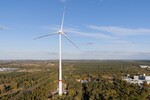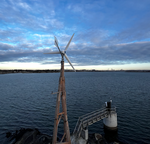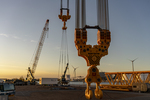News Release from Vestas
Wind Industry Profile of
Vestas unveils circularity solution to end landfill for turbine blades
“Until now, the wind industry has believed that turbine blade material calls for a new approach to design and manufacture to be either recyclable, or beyond this, circular, at end of life. Going forward, we can now view old epoxy-based blades as a source of raw material. Once this new technology is implemented at scale, legacy blade material currently sitting in landfill, as well as blade material in active windfarms, can be disassembled, and re-used. This signals a new era for the wind industry, and accelerates our journey towards achieving circularity,” says Lisa Ekstrand, Vice President and Head of Sustainability at Vestas.
Turbine blades have previously been challenging to recycle due to the chemical properties of epoxy resin, a resilient substance that was believed to be impossible to break down into re-usable components. This has led to many technology leaders attempting to replace or modify epoxy resin with alternatives that can be more easily treated. Vestas’ solution is enabled by a novel chemical process that can chemically break down epoxy resin into virgin-grade materials. The chemical process was developed in collaboration with Aarhus University, Danish Technological Institute, and Olin the partners of the CETEC project, a coalition of industry and academia established to investigate circular technology for turbine blades.
“The newly discovered chemical process shows that epoxy-based turbine blades, whether in operation or sitting in landfill, can be turned into a source of raw material to potentially build new turbine blades. As the chemical process relies on widely available chemicals, it is highly compatible for industrialisation, and can therefore be scaled up quickly. This innovation would not have been possible without the ground-breaking CETEC collaboration between industry and academia enabling our progress until this point,” says Mie Elholm Birkbak, Specialist, Innovation & Concepts at Vestas.
Through a newly established value chain, supported by Nordic recycling leader Stena Recycling and global epoxy manufacturer Olin, Vestas will now focus on scaling up the novel chemical disassembly process into a commercial solution. Once mature, the solution will signal the beginning of a circular economy for all existing, and future epoxy-based turbine blades.
“As the leading customer solution provider of innovative epoxy systems, Olin is proud to support the anticipated massive expansion in wind energy worldwide. By utilising unique technologies, together with our partners, we are ready to recover molecules and convert them into new epoxies that can be re-used in wind turbine blades. We are excited to bring our expertise and unique asset footprint to this partnership, and realize breakthrough sustainable material solutions for existing wind blades and those of the future”, says Verghese Thomas, Vice President, Epoxy Systems and Growth Platforms at Olin.
“In the coming years, thousands of turbines will be decommissioned or repowered, representing a major sustainability challenge but also a valuable source of composite materials. As one of Europe’s leading recycling groups with a wide footprint in Europe, we have a central role in the transition to a circular economy. We see this solution as a huge opportunity to take part in making a sustainable solution even more sustainable and circular and are ready to apply our chemical recycling expertise and knowledge to this process”, says Henrik Grand Petersen, MD Stena Recycling Denmark.
For several decades, producing wind turbine blades manufactured with epoxy-based resin has been standard practice in the wind industry. In the most mature markets for wind energy, the first turbines are reaching the end of their operational life and this will increase over the coming years. WindEurope expects around 25,000 tonnes of blades to reach the end of their operational life annually by 2025.
Once mature, the new solution will provide Vestas with the opportunity to produce new turbine blades made from re-used blade material. In the future, the new solution also signals the possibility to make all epoxy-based composite material a source of raw material for a broader circular economy, potentially encompassing industries beyond wind energy.
- Source:
- Vestas
- Author:
- Press Office
- Link:
- www.vestas.com/...
- Keywords:
- Vestas, circular economy, landfill, turbine blades, recycling, expoxy, rotor blade, wind turbine, re use, material

























